现在完成时讲解(经典)
现在完成时讲解

现在完成时讲解1构成方式:主语+have/has +过去分词2基本用法1) 表示过去发生或已完成的某个动作对现在产生的影响或结果,强调的是这个影响或结果,常同already, just, yet等状语连用例:I have just turned off the light. 我刚刚把灯关上。
(结果是灯已经关上了)She has lost her bike.她把自行车丢了。
(影响是他现在没有自行车骑了)The rain has stopped now.雨已经停了。
(结果是我们可以出门了)I have already read the book.我已读过这本书了。
(结果是已知道这本书的内容)She has had a good education.她受到过良好的教育。
(影响是她文化水平高,有修养)2) 表示开始于过去、持续到现在的动作或状态,并可能继续下去(也可能不继续下去),常同包括现在在内的时间状语连用,如:today, now, this week, this morning, these days, this afternoon, recently, so far等;也同“for+时间段”或“since+时间点”的状语连用例:We have had much snow this winter. 今年冬天多雪。
She has taught in the school for ten years.她在这所学校教书已经10年了。
I haven't eaten anything since breakfast.我从早饭起就一直没有吃东西。
We have been busy this morning.今天上午我们一直很忙。
I have known her since we were children.我从小就认识她。
I haven't seen John today.我今天没有见到约翰。
现在完成时讲解课件

2 cry---- cried 3 carry--- carried 4 worry--- worried
5 study--- studied
末尾只有一个辅音字母的 末尾是“辅音字母
重读闭音节词,双写这个 +y”的动词
辅音字母后加 ed
变“y”为“i”加 ed
Group Five
Group Six
不规则动词过去分词需要单独记忆
现在完成时的主要用法
1.表示过去发生的某一动作对现在造成的影响或结果。 He has already seen the film . I have already lost my book. I haven’t read that book yet . I have just cleaned my hands.
eg: I saw the film on television yesterday .
但since(自…以来)+某一过去时间或叙 述过去事情的从句总是与现在完成时 连用。
eg: They have known each other since 1950 .
Since he was a child ,he has lived in England.
Yes, he ____________ here for seven days. 5.Hi Jim! Where _______ you _________ ?
Li Lei is looking for you.
上一页
主菜单
下一页
6.—Where is your brother? —He ____________ the shop. He’ll be back soon.
move there—be there open —— be open 等
现在完成时讲解(完整版)(共17张PPT)
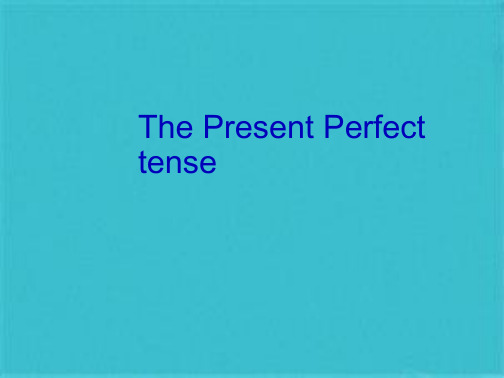
4. My friends haven’t visited me ___s_in_c_efew days ago.
5. We haven’t used our car _____faorlong time .
I have planted all the trees. 注:主语假设是第三人称单数助动词用 has
finished 9. goes 10. have, found 11. is He’ll be back soon.
Where’s Li Ming ? He __________ (go) to the teacher’s office.
否认形式 haven’t ( have not 〕 +过去分词 I ________ (see) it last week.
Where’s Li Ming ? He __________ (go) to the teacher’s office.
hasn’t ( has not ) +过去分词 have, stayed 8.
have, finished
have, stayed
• 1. have, seen, saw 2. Has, finished 3. has, —Yes, I ___________ New York twice.
You have planted all the trees. since: (自…以来)
6. She hasn’t had a good cup of coffee _____yefaorrs.
7. Tom has worn glasses _______he was 7 years old. since
现在完成时的用法详解英语

• Is your father in ?
•
No, heha__s_g__o_n__e__t_o___ to Shenzhen.
•
H__a__s___he everb_e_e__n__ there before ?
•
Yes, heh_a_s__b_e__e_n_____ there several times
ago.
A. Did…copy…did
B. Have…copied…have
C. Have…copied…did D. Did …copy…had
5. “Why _A_____ she _______ angry ?”
“Because he _____ at her just now .”
A. did…get…shouted B. has…got…shouted
A. Have…gone to B. Have…gone in
C. Have…been to D. Have …been in
3. My brother _C___college for over three years.
A. has gone to B. has been to C. has been at
但是不能和表示一段时间的状语连用。
短暂性动词变延续性动词:
• join --- be in / a
2) comeb-e-- in / at
• 3) borrow ---keep 4) buy -h-a-ve
5) arrive ---be
6) leave b--e- away (from)
7) begin --b- e on
• It has been colds_in__c_e__ two weeks ago.
现在完成时讲解

现在完成时讲解LEKIBM standardization office【IBM5AB- LEKIBMK08- LEKIBM2C】现在完成时讲解一.基本结构:助动词have/has+过去分词(done)二.句型:否定句:主语+have/has+not+过去分词+其他. 一般疑问句:Have/Has+主语+过去分词+其他. 简略答语: Yes, 主语 + have/has.(肯定) No, 主语 + haven't/hasn't.(否定)三.用法(1)现在完成时表示过去发生或已经完成的动作对现在造成的影响或结果I have spent all of my money (so far).(含义是:现在我没有钱花了.)Guo zijun has (just/already) come. (含义:郭子君现在在这儿)My father has gone to work.(含义是:我爸爸现在不在这儿)(2)现在完成时可以用来表示发生在过去某一时刻的,持续到现在的动作(用行为动词表示)或状态(be动词表示)常与for(+时间段),since(+时间点或过去时的句子)连用.①for+时段②since+过去一个时间点(译为:自从……以来)③since+时段+ago④since+从句(过去时)⑤It is+时段+since+从句(过去时)Mary has been ill for three days.I have lived here since 1998.四.has gone (to),has been (to), has been (in) 的区别Have/Has gone(to) :去了(现在不在说话现场)Where is your father?He has gone to Shanghai.Have/Has been (to) :去过(已不在去过的地方)My father has been to Shanghai.Have/has been in:呆了多久(还在所呆的地方)My father has been in Shanghai for two months. /since two months ago.五.现在完成时的标志1.现在完成时的含义之一是过去完成的动作对现在仍有影响,用以下四大标志词可以表达这种含义:* 以already, just和yet为标志He has already got her help.他已得到她的帮助。
初中现在完成时讲解ppt

since
for
since
for
since
练习题: 1.It's a long time since we ____ (meet) last, isn't it? 2.--I know you ___________ (choose) a picture book among these. --Yes,Have a look at it, please. 3.So far, spaceships without people ___________ (reach) the moon and some other parts of the universe. 4.My father____ home for nearly three weeks. A.has gone away from B.has left C.has been away from D.went away 5.Mr. and Mrs. Green have_____in China for a week. A.been B.got C.arrived D.reached
eg.--- I’ve lived here for 15 years. eg.--- I’ve lived here since 15 years ago(1990)
选用for和since填空: 1.We haven’t seen each other ______ a long time. 2.His father has been in the factory ______ 10 years ago. 3.The film has been on ______ 20 minutes. 4.Mr Green has worked here ______ he came to China. 5.His grandparents have been dead ______ several years. 6. It’s five years _______ we met last time
现在完成时的用法讲解
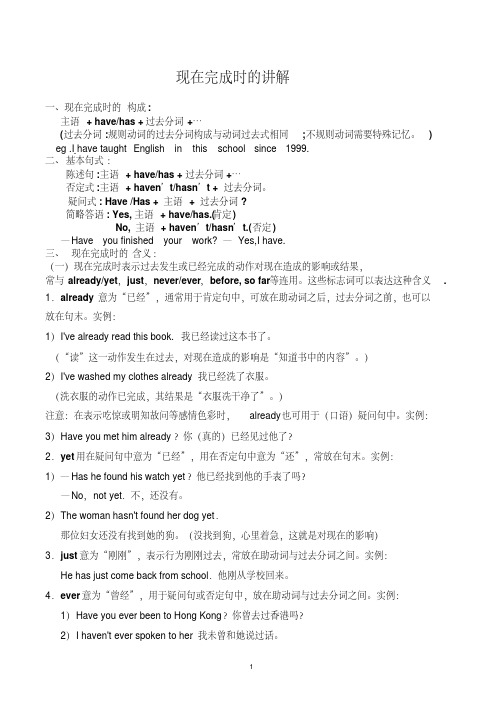
现在完成时的讲解一、现在完成时的构成:主语+ have/has + 过去分词+…(过去分词:规则动词的过去分词构成与动词过去式相同;不规则动词需要特殊记忆。
) eg .I have taught English in this school since 1999.二、基本句式:陈述句:主语+ have/has + 过去分词+…否定式:主语+ haven’t/hasn’t + 过去分词。
疑问式: Have /Has + 主语+ 过去分词?简略答语: Yes, 主语+ have/has.(肯定)No, 主语+ haven’t/hasn’t.(否定)—Have you finished your work? —Yes,I have.三、现在完成时的含义:(一)现在完成时表示过去发生或已经完成的动作对现在造成的影响或结果,常与already/yet,just,never/ever,before, so far等连用。
这些标志词可以表达这种含义. 1.already意为“已经”,通常用于肯定句中,可放在助动词之后,过去分词之前,也可以放在句末。
实例:1)I've already read this book. 我已经读过这本书了。
(“读”这一动作发生在过去,对现在造成的影响是“知道书中的内容”。
)2)I've washed my clothes already.我已经洗了衣服。
(洗衣服的动作已完成,其结果是“衣服冼干净了”。
)注意:在表示吃惊或明知故问等感情色彩时,already也可用于(口语)疑问句中。
实例:3)Have you met him already ?你(真的)已经见过他了?2.yet用在疑问句中意为“已经”,用在否定句中意为“还”,常放在句末。
实例:1)—Has he found his watch yet ?他已经找到他的手表了吗?—No,not yet.不,还没有。
2)The woman hasn't found her dog yet .那位妇女还没有找到她的狗。
初中英语现在完成时讲解全(共24张PPT)

I studied English ten years ago.
(come来到某地….
left the team
has been on C.
表示动作发生在过去,对现在造成的影响。
)
be over
went to bed
填空使用for和since
Tom ___for several hours.
表示动作发生在过去,对现在造成的影响。
• She has lived here ______1996.
• 2 标准词:so far/up to now (到目前为止) ;lately/recently(最近)
• Up to now/So far ,I haven’t been successful.
• Lately/Recently,I haven’t seen my teacher.
3. He bought the motorbike a month ago.
---He ____ ____ the motorbike for a month. 4. He arrived here three days ago.
--- He ____ ____ here since three days ago. 5. They turned off the light 2 hours ago.
(finish结束....)
be over
1.我买这本书三年了。Buy I have bought the book.
(1) I have had the book for 3 years. (2) I have had the book since 3 years ago.
了borrow He has borrow the book. (1)He has kept the book for 2 months . (2) He has kept the book since 2 months ago.
现在完成时讲解(详细、简单)
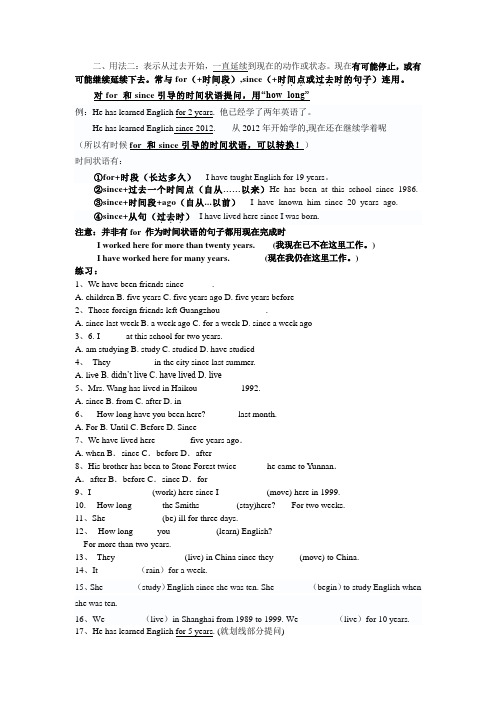
二、用法二:表示从过去开始,一直延续到现在的动作或状态。
现在有可能停止,或有可能继续延续下去。
常与for(+时间段...或过去时的句子......)连用。
...),since(+时间点对for 和since引导的时间状语提问,用“how long”例:He has learned English for 2 years. 他已经学了两年英语了。
He has learned English since 2012. -从2012年开始学的,现在还在继续学着呢(所以有时候for 和since引导的时间状语,可以转换!)时间状语有:①for+时段(长达多久)I have taught English for 19 years。
②since+过去一个时间点(自从……以来)He has been at this school since 1986.③since+时间段+ago(自从...以前)I have known him since 20 years ago.④since+从句(过去时...)I have lived here since I was born.注意:并非有for 作为时间状语的句子都用现在完成时I worked here for more than twenty years. (我现在已不在这里工作。
)I have worked here for many years.(现在我仍在这里工作。
)练习:1、We have been friends since ______.A. childrenB. five yearsC. five years agoD. five years before2、Those foreign friends left Guangzhou __________.A. since last weekB. a week agoC. for a weekD. since a week ago3、6. I _____ at this school for two years.A. am studyingB. studyC. studiedD. have studied4、They _________ in the city since last summer.A. liv eB. didn’t liveC. have livedD. live5、Mrs. Wang has lived in Haikou _________ 1992.A. sinceB. fromC. afterD. in6、---How long have you been here? --- ____ last month.A. ForB. UntilC. BeforeD. Since7、We have lived here _______ five years ago.A. when B.since C.before D.after8、His brother has been to Stone Forest twice ______ he came to Yunnan.A.after B.before C.since D.for9、I _____________ (work) here since I __________ (move) here in 1999.10. ---How long ______ the Smiths ________(stay)here? ---- For two weeks.11、She ____________ (be) ill for three days.12、--How long _____you __________(learn) English?---For more than two years.13、They _______________ (live) in China since they _____ (move) to China.14、It _______(rain)for a week.15、She _______(study)English since she was ten. She _______(begin)to study English when she was ten.16、We _______(live)in Shanghai from 1989 to 1999. We _______(live)for 10 years.17、He has learned English for 5 years. (就划线部分提问)________ ________ ________ _________ learned English ?18、We began to learn English three years ago.(改为同义句)We _______ _______ English ________ three years19、He has lived here since 1999.(就划线部分提问)_____ _____ _____ he_______ here?20、Mr. Li began to teach English in this school in 1999.(同义句)Mr. Li _______ _________ English in this school since 1999.21、The factory opened ten years ago.(同义句)The factory _______ ________ ______ for ten years.22、His company closed in 2003. (同义句)His company _____ _____ _____ _____ 2003.23、We got to know each other for about 15 years. (同义句)We _______ ________ each other _____ about 15 years.三、注意:在现在完成时中与for 和since引导的时间状语,how long连用的动词必须为延续性动词。
现在完成时讲解

现在完成时讲解第一部分:现在完成时表示过去发生或已经完成的动作对现在造成的影响或结果,也可表示过去已经开始,一直延续到现在的动作或状态。
学习现在完成时,先从结构和句式开始:构成:主语 + have / has + 过去分词 + 其他(当主语是第三人称单数时用has,其余人称用have。
过去分词:规则动词的过去分词构成与动词过去式相同;不规则动词需要特殊记忆。
)否定式:主语+ haven’t / hasn’t +过去分词 + 其他疑问式:Have / Has + 主语 + 过去分词 + 其他?简略答语:Yes, 主语 + have / has.(肯定)No, 主语+ haven’t / hasn’t.(否定)第二部分:现在完成时的含义之一是过去完成的动作对现在仍有影响,用以下四大标志词可以表达这种含义:1.以already, just和yet为标志already, just和yet表示到现在为止动作或状态已经、刚刚或还没有发生。
He has already got her help.他已得到她的帮助。
He has just seen the film.他刚刚看过这场电影。
He hasn’t come back yet.他还没有回来。
2.以ever和never为标志ever和never表示到现在为止动作或状态曾经或从来没有发生过。
This is the best film I have ever seen.这是我曾经看过的最好的一部电影。
He has never been to Beijing.他从没有到过北京。
3.以动作发生的次数为标志若某一动作到现在为止已经发生了若干次,则要使用现在完成时。
He says he has been to the USA three times. 他说他已经去过美国三次了。
4.以so far为标志so far往往表示到目前为止动作或状态已经发生。
He has got to Beijing so far.到目前为止他已到了北京。
初中英语语法现在完成时精讲PPT

since and for
The woman has worked at this school for 2 years.( since two years ago)
4. 现在完成时常常与表示频度的时间状语 连用,如often, sometimes, ever, never, twice, on several occasion等:
Have you ever been to Beijing? I have never heard of Bunny. I have used this pen only three times. George has met that gentleman on several occasions.
__f_o_r __two days
__s_in_c_e__1997
__si_n_ce__yesterday
__fo_r___two weeks
afternoon
___s_in_c_e _three years
__si_n_ce__I came here ago
__si_n_ce__last Sunday __s_in_c_e__ last month
for + 时间段 for 2 years/a long time
since+时间点 since 2 years ago
since 1998 since she came to the school)
一、用for和since填空。
(完整版)现在完成时讲解(含讲解及习题)(可编辑修改word版)

现在完成时讲解一、构成:肯定式:主语+ 助动词have/has + 动词的过去分词.疑问式:助动词Have/Has + 主语+ 动词的过去分词?否定式: 主语+ 助动词have/has + not + 动词的过去分词.过去分词规则变化:a)一般情况下,直接加ed, (work---worked,water---watered, finish---finished 等;)b)以“辅音字母+ y”结尾的动词, 把y 变成i 再加ed, (carry-- -carried study---studied 等;)c)以辅+元+辅结尾且中读的动词,要双写最后一个辅音字母,再加ed。
(stop---stopped,shop---shopped)d)以不发音的e 结尾的动词,只加d(过去分词不规则变化表:二、用法:用法一:表示过去(已经、曾经或从未)发生的某一动作对现在造成的影响或结果。
标志词:①already, ②never, ③ever, ④just, ⑤yet, ⑥before,⑦once/twice/数字+ times例:I have cleaned my room. 我已打扫了房间(房间现在是干净的,不需要打扫了)They have left. --他们已经离开了,也就是说现在他们人不在这里I have never had a car (我从未有过汽车。
)I have been there twice.a)already 往往用于肯定句,用在疑问句时表示强调或加强语气;yet 用于否定句和疑问句。
•He has already left here. 他已经离开这里了。
•Has he already left here? 他(真的)已经离开这里了吗?(表示加强语气)•My teachers haven’t had breakfast yet. 我的老师们还没有吃早饭。
•Have you written to your parents yet? 你已经给你父母写过信了吗?b)never 是否定词,表示“从来没有”,而ever 表示“曾经”•We have never been to the Great Wall. 我们从来没有去过长城。
现在完成时讲解课件

现在完成时 ( present perfect tense)
past
present(now)
future
do my homework
现在完成时的构成
have (has)+ 过去分词
上一页
主菜单
下一页
Mother: John, clean your teeth please. John: Mum, I have already(已经) cleaned them.
现在完成时的基本句型:
肯定式:主语 + 助动词have/has + 动词的过去分词. 疑问式:助动词Have/Has + 主语 + 动词的过去分词? 否定式: 主语 + 助动词have/has + not + 动词的过去分词.
例句:
6. Has he gone to the library ? 他是去了图书馆吗? Yes ,he has. 是的,是去那里了。 No, he hasn’t. 不,他没去那里。
3.have been in 意思是“呆在某处一段时间 了" Eg.She has gone to Nanjing.
与一般过去时的用法比 较
一.现在完成时和一般过去时都是说过 去的事情,但现在完成时注意的不 是事情本身,而是强调事情与现在 保持的某种密切联系(如现在的结 果,影响,一直延续到现在等);而一 般过去时,则只讲述发生在过去的 动作和事情与现在没有关系。
• He has just come back. 他刚刚回来。
• They have just finished the work. 他们刚刚完成那项工作。
现在完成时的时间状语
现在完成时讲解
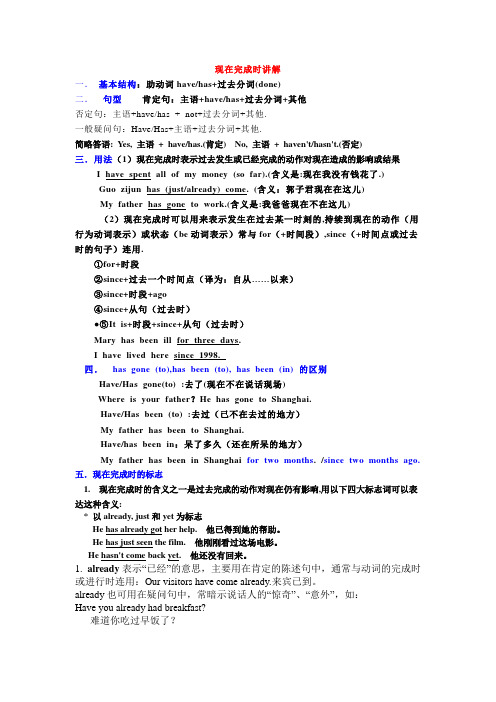
现在完成时讲解一.基本结构:助动词have/has+过去分词(done)二.句型肯定句:主语+have/has+过去分词+其他否定句:主语+have/has + not+过去分词+其他.一般疑问句:Have/Has+主语+过去分词+其他.简略答语: Yes, 主语+ have/has.(肯定)No, 主语+ haven't/hasn't.(否定)三.用法(1)现在完成时表示过去发生或已经完成的动作对现在造成的影响或结果I have spent all of my money (so far).(含义是:现在我没有钱花了.)Guo zijun has (just/already) come. (含义:郭子君现在在这儿)My father has gone to work.(含义是:我爸爸现在不在这儿)(2)现在完成时可以用来表示发生在过去某一时刻的,持续到现在的动作(用行为动词表示)或状态(be动词表示)常与for(+时间段),since(+时间点或过去时的句子)连用.①for+时段②since+过去一个时间点(译为:自从……以来)③since+时段+ago④since+从句(过去时)●⑤It is+时段+since+从句(过去时)Mary has been ill for three days.I have lived here since 1998.四.has gone (to),has been (to), has been (in) 的区别Have/Has gone(to) :去了(现在不在说话现场)Where is your father?He has gone to Shanghai.Have/Has been (to) :去过(已不在去过的地方)My father has been to Shanghai.Have/has been in:呆了多久(还在所呆的地方)My father has been in Shanghai for two months. /since two months ago.五.现在完成时的标志1.现在完成时的含义之一是过去完成的动作对现在仍有影响,用以下四大标志词可以表达这种含义:* 以already, just和yet为标志He has already got her help.他已得到她的帮助。
现在完成时讲解(全)
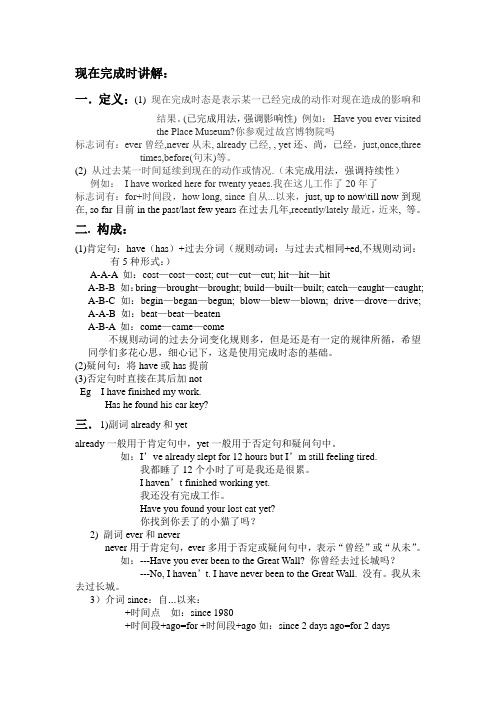
现在完成时讲解:一.定义:(1)现在完成时态是表示某一已经完成的动作对现在造成的影响和结果。
(已完成用法,强调影响性) 例如:Have you ever visitedthe Place Museum?你参观过故宫博物院吗标志词有:ever曾经,never从未, already已经, , yet还、尚,已经,just,once,three times,before(句末)等。
(2)从过去某一时间延续到现在的动作或情况.(未完成用法,强调持续性)例如:I have worked here for twenty yeaes.我在这儿工作了20年了标志词有:for+时间段,how long, since自从...以来,just, up to now\till now到现在, so far目前in the past/last few years在过去几年,recently/lately最近,近来, 等。
二. 构成:(1)肯定句:have(has)+过去分词(规则动词:与过去式相同+ed,不规则动词:有5种形式:)A-A-A 如:cost—cost—cost; cut—cut—cut; hit—hit—hitA-B-B 如:bring—brought—brought; build—built—built; catch—caught—caught;A-B-C 如:begin—began—begun; blow—blew—blown; drive—drove—drive;A-A-B 如:beat—beat—beatenA-B-A 如:come—came—come不规则动词的过去分词变化规则多,但是还是有一定的规律所循,希望同学们多花心思,细心记下,这是使用完成时态的基础。
(2)疑问句:将have或has提前(3)否定句时直接在其后加notEg I have finished my work.Has he found his car key?三.1)副词already和yetalready一般用于肯定句中,yet一般用于否定句和疑问句中。
- 1、下载文档前请自行甄别文档内容的完整性,平台不提供额外的编辑、内容补充、找答案等附加服务。
- 2、"仅部分预览"的文档,不可在线预览部分如存在完整性等问题,可反馈申请退款(可完整预览的文档不适用该条件!)。
- 3、如文档侵犯您的权益,请联系客服反馈,我们会尽快为您处理(人工客服工作时间:9:00-18:30)。
上一页
主菜单
下一页
现在完成时的主要用法
2.表示过去某一时间开始并一直持续到现在的
动作或状态,常和表示一段时间的时间状语连 用,谓语动词多用延续性动词。(这一用法与现
在完成进行时相同: have / has + been + v.ing。) They have lived here for 30 years. 他们已经在这儿住了30年。 (30年以前开始住在这儿,现在还住在这儿。) I have learned English since I was five years old. 我从五岁时就学英语。 (五岁时开始学英语,到现在还在学。)
1.我买了这块手表五年了。 I have bought this watch for five years.W I have had this watch for five years/since 5 years ago.
2.这位老人已经死了十年了。
The old man has died for ten years. W The old man has been dead for ten years/since 10 years ago.
上一页
主菜单
下一页
3.他已经回来三天了。 He has come back for 3 days. W He has been back for 3 days/since 3 days ago. 4.自从六点钟他就来这儿了。 He has come here since 6 o’clock. W He has been here since 6 o’clock. 5.我离开家乡已十年了。 I have left hometown for 10 years. W I have been away from hometown for 10 years.
上一页
主菜单
下一页
●但在否定句中,短暂性动词可
以与时间段连用。
如:I haven’t bought the bike for a year. 我买这辆自行车还不到一年。 She hasn’t come here for an hour. 她来这儿还没有一个小时。
上一页 主菜单
下一页
翻 译 练 习:
A B B型
过去式和过去分词同形:
buy find feel have bought found felt had bought found felt had
A B C型
原形、过去式和过去分词各异
do go fly write did went flew wrote done gone flown written
past
present(now)
future
do my homework
现在完成时的主要用法
1.表示过去发生的某一动作对现在造成的影响或结果。 -- It’s so dark. --Someone has turned off the light. (有人刚把灯关了,对现在造成的结果是:现在很黑) -- Are you free? --I have finished my homework. I am free (我已经完成了家庭作业,对现在造成的结果是很有空)
reach-- be (in/at)
buy-- have borrow-- keep
open--be open
return-- be back marry--be married
finish-- be over
become-be
短暂性动词与时间段的关系
●短暂性动词在肯定句、疑问句中不能与时
②begin, ③buy, ⑤come (go, arrive), ⑦finish, ⑧join,
上一页
主菜单
下一页
现在完成时的主要用法
2.表示过去已经开始,
持续到现在的动作或状 态.常与since + 过去的时间点,for + 一段时 间,so far 等时间状语连用。
I have learnt English for more than ten years.我已经学了10多年的英语。 (从10年前开始,持续到现在还在学) She has swum since half an hour ago. 我已经游泳了半个小时 (半个小时前已经开始游泳,到现在还在游)
A B A型
原形与过去分词同形
come
become came became come become
A A B型
原形与过去式同形
beat beat beaten
延续性动词和非延续性动词(终止性动词) 延续性动词表示能够延续的动作 如:learn, work, keep, have, wait, stay等。 延续性动词可以与表示时间段的状语连用。 非延续性动词也称终止性动词、瞬间动词,表 示 不能延续的动作,这种动作发生后立即结束,不 能与表示一段时间的状语连用。 如:die, begin, finish, come, go, open, leave, join, marry / get married等。
He has been here for three days.
He has been here since yesterday. He has been here since two days ago / last Monday. He has been here since his wife died.
现在完成时的主要用法
3.表示人曾有过或到目前为止从 未有过的经历.
I have ever been to the Summer Palace?
(我曾去过颐和园)
I have never had a car.
(我从未有过汽车。)
上一页
主菜单
下一页
现在完成时的时间状语
◆常与①already,
②never, ③ever, ④just, ⑤yet, ⑥before, ⑦up to now, ⑧so far, ⑨for the last few weeks ⑩these days, ⑾since ⑿for a long time 连用
上一页
主菜单
下一页
用have been to, have gone to, have been in的适当形 式填空 1. - Where is Tom? – He has gone to the library. 2. How many times have you been to Paris? 3. I haven’t seen you for a long time. Where have you been? I have been to Guangzhou. 4. How long have you been in this school? I have been in this school for three years. 5. My brother has been in the army since he left high school.
现在完成时
现在完成时的构成 现在完成时的主要用法
现在完成时的时间状语
短暂性动词与时间段的关系
have been 与have gone 比较
与一般过去时的用法比较
上一页 主菜单
下一页
现在完成时的构成
have (has)+ 过去分词
上一页
主菜单
下一页
现在完成时 ( present perfect tense)
• He has just come back.
他刚刚回来。
• They have just finished the work. 他们刚刚完成那项工作。
4)for 和 since for 后面跟一段时间,since后面跟的是时间点,这 个时间点可能是单词、短语或一般过去时的句子。 带有for或since短语的句子,谓语动词要用延续性 动词。
4. 过去分词的构成:
规则动词过去分词的构成和过去式一样,不规则 动词的过去分词见课本(八下或九年级课本最后 一页)。 记忆不规则动词的过去式和过去分词,可以分为 以下几类来记:
A A A型
原形、过去式和过去分词同形:
hit put hit put hit put
let read cost
let let read read cost cost
• 2)ever和never • ever用于肯定句和疑问句中,在句中位 于助动词或系动词后,实义动词前。 • never用于句中,助动词或系动词后, 实义动词前,表示否定意义。 • He has ever been to Paris. • He has never been to Paris.
3) just表示“刚刚”(用于完成时态时,与 already,never 等副词的位置一样,多用在助动词 have/has和动词过去分词之间)
I have been here since 5 years ago.
I have been here since I graduated in 2000.
注 2): 对 for 或 since 引导的时间 状语提问 必须用how long, 决 不能用when. Eg. I have lived here for 10 years. How long have you lived here? She has stood here since 2 hour ago.How long has she stood here?
现在完成时的运用:
• 1)already 和yet • already用于肯定句,放于句中或句末,在 句中时,位于助动词或系动词后,实义动 词前。 • yet用于否定句和疑问句,一般在句末。 • I have already finished my homework. • I haven’t finished my homework yet.
